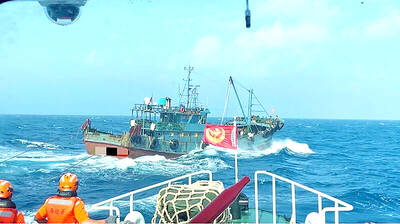The Royal Bank of Canada and Swiss drugs giant Roche won the dubious honor on Wednesday of an award for the worst firms for the environment and social responsibility, announced in Davos.
The Canadian bank received the prize for being the “largest financier of environmentally as well as socially disastrous oil sands extraction in the Canadian province of Alberta,” said ecological group Greenpeace and Swiss non-governmental organization Berne Declaration.
Roche meanwhile won the “People’s Award,” having received the most votes from the public over its organ transplant studies in China, where more than 90 percent of all transplanted organs originated from prisoners, organizers said.
“Roche cannot and will not confirm the origins of some 300 organs used for its trials,” organizers said, during the awards at the sidelines of the World Economic Forum in the Swiss mountain resort of Davos.
Roche said it conducted drug trials of its Cellcept medication on patients in China, but that it did not have the right to know the origins of the organs, a spokeswoman said.
“The problem [of executions] has been known for several years and we are working to improve the situation” such that the Chinese authorities would conform to international norms in the issue of organ donations, she said.
The Canadian bank was not immediately available for comment on the award.
The two lobby groups also awarded the “Greenwash Award” to the UN’s CEO Water Mandate, which, according to its Web site, is “a unique public-private initiative designed to assist companies in the development, implementation and disclosure of water sustainability policies and practices.” It includes UN agencies, NGOs and companies that use water as a raw material in their products.
While these companies, such as Coca Cola, Dow Chemical or Nestle, are expected to help find solutions to a looming water shortage crisis, they are “not doing it in reality,” award organizers said.

The Republic of China (ROC) is celebrating its 114th Double Ten National Day today, featuring military parades and a variety of performances and speeches in front of the Presidential Office in Taipei. The Taiwan Taiko Association opened the celebrations with a 100-drummer performance, including young percussionists. As per tradition, an air force Mirage 2000 fighter jet flew over the Presidential Office as a part of the performance. The Honor Guards of the ROC and its marching band also heralded in a military parade. Students from Taichung's Shin Min High School then followed with a colorful performance using floral imagery to represent Taiwan's alternate name

COGNITIVE WARFARE: Chinese fishing boats transmitting fake identification signals are meant to test Taiwan’s responses to different kinds of perceived incursions, a report said Chinese vessels are transmitting fake signals in Taiwan’s waters as a form of cognitive warfare, testing Taipei’s responses to various types of incursions, a report by the Institute for the Study of War said on Friday. Several Chinese fishing vessels transmitted fake automatic identification system (AIS) signals in Taiwan’s waters last month, with one mimicking a Russian warship and another impersonating a Chinese law enforcement vessel, the report said. Citing data from Starboard Maritime Intelligence, the report said that throughout August and last month, the Chinese fishing boat Minshiyu 06718 (閩獅漁06718) sailed through the Taiwan Strait while intermittently transmitting its own AIS

CHINESE INFILTRATION: Medical logistics is a lifeline during wartime and the reported CCP links of a major logistics company present a national security threat, an expert said The government would bolster its security check system to prevent China from infiltrating the nation’s medical cold chain, a national security official said yesterday. The official, who wished to stay anonymous, made the remarks after the Chinese-language magazine Mirror Media (鏡周刊) reported that Pharma Logistics (嘉里醫藥物流) is in charge of the medical logistics of about half of the nation’s major hospitals, including National Taiwan University Hospital and Taipei Veterans General Hospital. The company’s parent, Kerry TJ Logistics Co (嘉里大榮物流), is associated with the National Committee of the Chinese People’s Political Consultative Conference (CPPCC) and the Chinese People’s Liberation Army (PLA), the

COVETED PRIZE: The US president would be a peace prize laureate should he persuade Xi Jinping to abandon military aggression against Taiwan, William Lai said US President Donald Trump should get the Nobel Peace Prize should he be able to convince Chinese President Xi Jinping (習近平) to abandon the use of force against Taiwan, President William Lai (賴清德) told a conservative US radio show and podcast in an interview. The US is Taiwan’s most important international backer, despite the absence of formal ties, but since Trump took office earlier this year he has not announced any new arms sales to the nation. Trump could meet Xi at the APEC summit in South Korea on Oct. 31 and Nov. 1. Lai, speaking on The Clay Travis and Buck Sexton